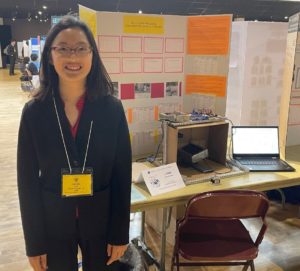
8th Grade Science Fair Interviews
by Ryan Park
For Science Academy’s 2022-2023 Science Fair, I interviewed two 8th graders to learn more about their projects: Dani Tsao, 1st place winner, and Aspen Chung, 2nd place winner.
* Dani Tsao’s Science Fair project built on her experiment from last year in creating a new type of solar panel.
What inspired you to choose your Science Fair topic?
My experiment this year is a continuation of last year’s project. I first thought of my idea when I was driving around my neighborhood and realized that there are mainly two types of solar panels: a) those that create electricity, and b) those that heat up water. When I saw this, I thought “Why can’t there be a solar panel to do both?”
What experiment did you do? What were your hypothesis and results?
With the above question in mind, I combined an electricity-generating and a water-heating solar system. Although the solar panel efficiency increased, I have thought of another idea for further improvement.
This year, I decided to make a control system that rotates the solar panel so that it always faces the sun. My results showed that this new solar panel design, combined with improved thermal insulation, increased the electricity-generating efficiency as well as heated up the water more. Compared to the original solar panel idea, this new design increased the energy capture efficiency by 25 – 30%.
Is there anything you’d like to say about receiving 1st place in your grade level?
I am very appreciative of this project because it allowed me to use the information I learned in Mr. Bradfield’s class about Arduinos and soldering. The award gives me a lot of satisfaction, but I think there are still more problems to be solved.

Dani at the L.A. County Science Fair
______________________________________________________________________________________________________
* Aspen Chung’s Science Fair project was about the growing danger of climate change and her method of using cleaner alternatives to carbon fossil fuels.
What inspired you to choose your Science Fair topic?
Our world is powered by fuel, ranging from transportation to heating to factories that produce many of the goods used in our daily lives. However, many of the non-green fuels that are commonly used contribute to climate change through carbon dioxide emissions, a greenhouse gas that is damaging our ozone layer. And in a world that is aiming to become greener, I believe it’s important to explore cleaner alternatives for fuel, such as hydrogen gas, which only emits water vapor as a byproduct.
What experiment did you do? What were your hypothesis and results?
My project focuses on finding the most effective way to produce hydrogen gas, which acts as a clean fuel source, through electrolysis. I varied the amounts of magnesium sulfate between 20 grams, 45 grams, and 75 grams to test how it affected the rate of electrolysis and the change in pH. I hypothesized that if the water has more magnesium sulfate, then the rate of electrolysis will be faster and the pH will change quickly. My hypothesis was proven correct through my experiment, where 75 grams of magnesium sulfate produced the fastest-changing pH, demonstrating a more efficient rate of electrolysis.

Aspen’s Science Fair Board




